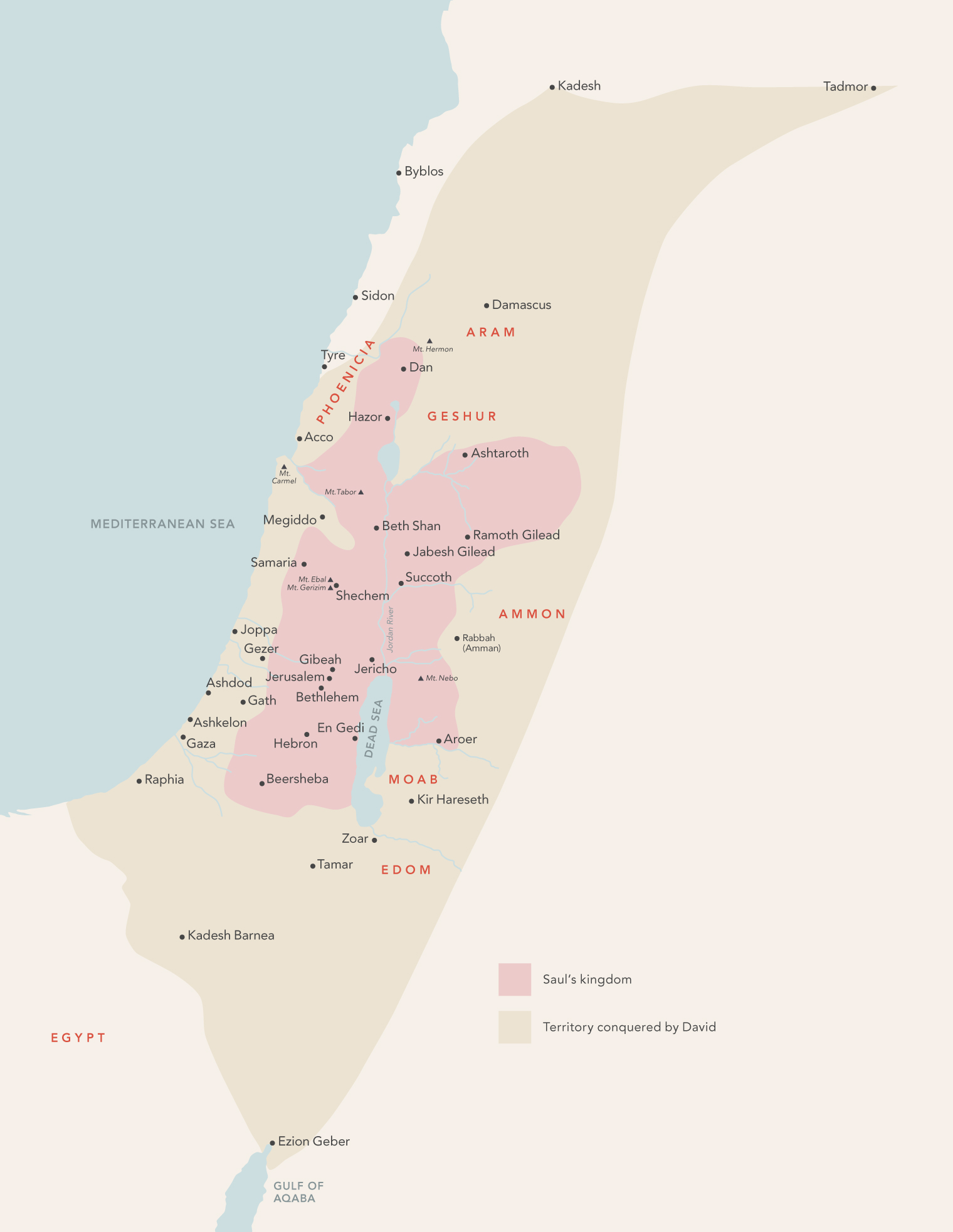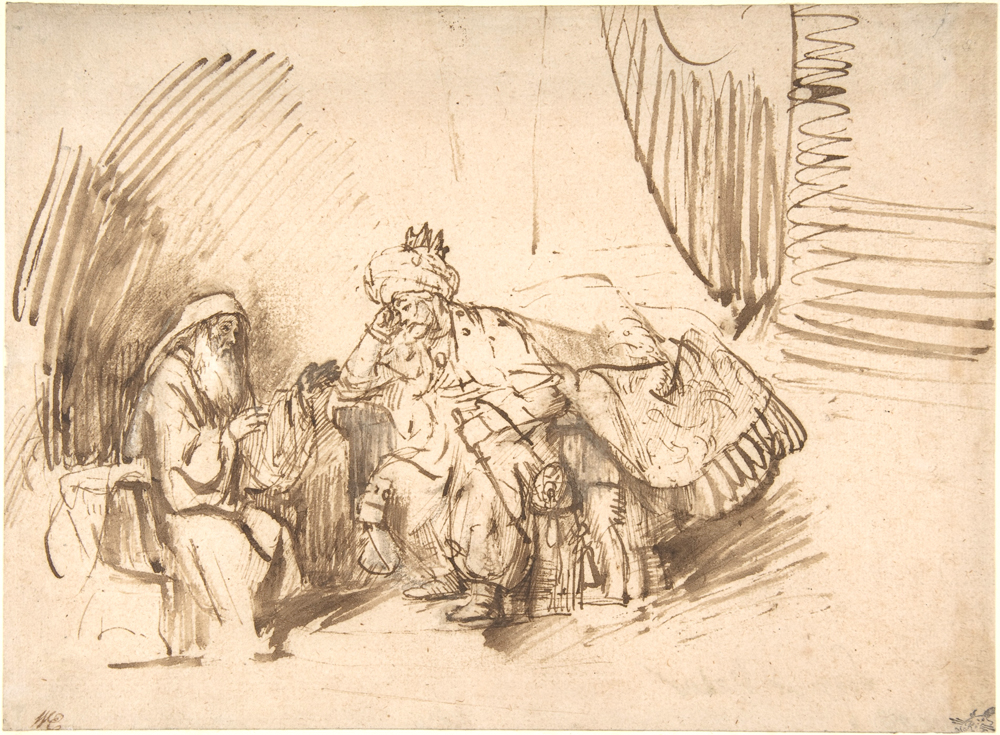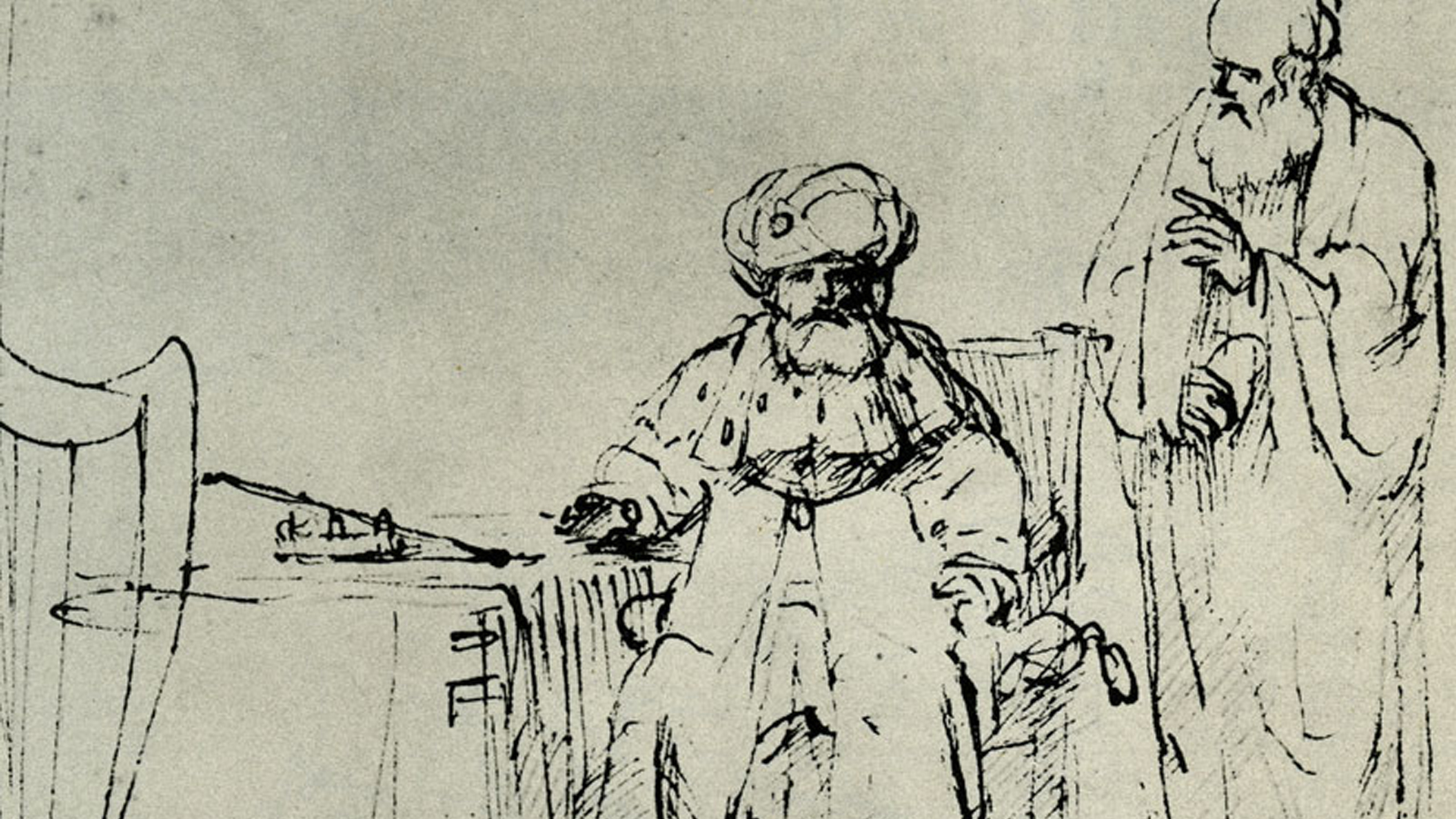David, King of Israel
As David takes his place on the throne of Judah and then all Israel, his multifaceted character becomes increasingly evident. Both his strengths and his notable flaws make him one of history’s most storied monarchs.
READ PREVIOUS
(PART 17)
GO TO SERIES
The book of 2 Samuel is the story of David’s kingship following the death of his nemesis, Saul, the failed monarch rejected by God and frequently distressed by a troubling spirit.
The book opens with a second account of the demise of Saul and his son Jonathan. This differs from the previous telling, where Saul killed himself by falling on his sword (1 Samuel 31:4), in that an Amalekite arrives from the battlefield and informs David that he has killed Saul at his own request (2 Samuel 1:2–10a). David’s response was to order the immediate execution of the young man for slaying “the Lord’s anointed.” We must assume that the king did not yet know the real circumstances of Saul’s death and that the runaway Amalekite was lying in hope of securing a reward for bringing Saul’s royal insignia of crown and armlet to David (verse 10b).
But David and his men took no pleasure in the deaths of Saul and Jonathan, formalizing their sorrow in a eulogy that begins, “The beauty of Israel is slain on your high places! How the mighty have fallen!” (see verses 19–27). Though Saul had treated David badly for years, the young king showed no hatred for him nor satisfaction at his death.
King of Judah
At this point in the account, David asked direction from God as to whether he should return to any of the cities within Judah. He was told that Hebron should be his destination. With his two wives and the men who had accompanied him through his years on the run from Saul, he went there and was made king by the house of Judah (2:1–4a, 7). This rule over Judah alone would last seven and a half years.
To the north, in Jabesh-Gilead in the Transjordan region, some of that city’s leaders had supported Saul and, following his death, had seen to his honorable burial. They had removed his body, along with those of his sons, from the city wall of Beth Shan, where the Philistines had impaled them. After burning the bodies, they buried the bones (1 Samuel 31:11–13). David sent them a message, recognizing their kindness and loyalty to Saul and announcing his appointment as king over Judah.
Perhaps David was attempting to unify all the tribes of Israel under his control by this action. If so, it did not pay out immediately because Abner, the commander of Saul’s army, brought Saul’s son Ishbosheth to Mahanaim (probably Gilead’s capital) and made him king over all Israel except Judah. Ishbosheth seems to have been under Abner’s control and reigned for only two years, perhaps after consolidating his rule gradually (2 Samuel 2:8–9).
During this time Joab, the son of David’s sister Zeruiah, was involved in a violent exchange with Abner and his men. The death of Joab’s brother Asahel at Abner’s hand brought much bloodshed. But Joab, commander of David’s men, lost only 19 (in addition to Asahel) to Abner’s 360. This was the beginning of a difficult time for Saul’s descendants: “Now there was a long war between the house of Saul and the house of David. But David grew stronger and stronger, and the house of Saul grew weaker and weaker” (2 Samuel 3:1).
We learn that during his years in Hebron, David had six children by six different mothers, one of whom was Absalom, who would later cause David great distress.
“The diversity of David’s harem suggests that he was deliberately using marriages for political, as well as familial, reasons; he was in fact skillfully consolidating his power base with them.”
As we’ve noted previously, the development of David’s biography takes place over a long period. During this time his character also develops. Though he is described at the end of his life as “a man of war,” he was also capable of heartfelt change when certain faults were shown to him. And though he maintained several wives and concubines, God also referred to him as “a man after his own heart.” David’s character was multifaceted, and God’s response to his weaknesses might seem at times uneven. But this can be explained.
A Reunited Kingdom
At this point in the story, Abner found reason to be angry with Ishbosheth because the young man had accused his commander of taking his father Saul’s concubine. Offended, Abner approached David and promised him his support, claiming to be able to bring all Israel under David’s control. The king invited Abner to meet with him, requesting at the same time that he return his wife, Saul’s daughter Michal, whom her father had given to another man. Was this an attempt on David’s part to divide the family of Saul and bring all Israel to his side?
Abner was able to achieve the return and to gain Israel’s backing for David. But when Joab came to Hebron and heard that Abner had visited and been allowed to depart, he had his men track him down. Joab then killed him in revenge for his brother Asahel’s death. This threatened to destroy the support of Israel David had gained through Abner. In the end, his empathetic decision to follow Abner’s coffin and sing a lament at the graveside saved the day. But David was deeply troubled by the actions of his nephews Joab and Abishai; “I am weak today, though anointed king; and these men, the sons of Zeruiah, are too harsh for me. The Lord shall repay the evildoer according to his wickedness” (verse 39). The people understood that it had not been David’s intent to kill Abner.
When Ishbosheth heard of Abner’s death he became very discouraged, as did many of the Israelites who were with him. But two of his servants, sensing the moment to take advantage, murdered him and brought his severed head to David. Further demonstrating his compassion toward the house of Saul, the king had the murderers executed.
Now, as David reached the age of 30, he became king of all Israel: “Therefore all the elders of Israel came to the king at Hebron, and King David made a covenant with them at Hebron before the Lord. And they anointed David king over Israel” (5:3). He would reign over Israel and Judah from Jerusalem for the next 33 years, making his reign 40 years in all.
The establishing of Jerusalem as his capital was a major event in David’s early years. He captured the city from the Jebusites, fortified it, and built a palace with the help of Hiram, king of Tyre. In Jerusalem he would take more wives and concubines and would father an additional 11 children, among them his successor, Solomon.
Royal Deeds
In the wake of David’s appointment as king over all Israel, the Philistines twice came against him but were defeated, leaving their idols behind and retreating to their cities. Now, in what might be seen as a counter to Philistine idolatry, David decided to bring the ark of the covenant to his capital from Kirjath-Jearim, where it had been kept in the house of Abinadab since the time of the prophet Samuel (6:2). Saul, it seems, had not paid much attention to it, but David restored it to a place of prominence among the people.
On the journey one of the sons or grandsons of Abinadab, named Uzzah, reached out to steady the ark as the oxen pulling the cart stumbled. This impulsive move, characterized as an “error,” caused his death, perhaps because only specific Levites were allowed to carry the ark, and they were to do so by using poles, not a cart, to avoid having to touch it (Exodus 25:14–15; Numbers 4:15; Deuteronomy 10:8). Uzzah’s death was a stern warning of the perils of disobeying God’s clear instructions and of the sanctity of the ark and its contents.
Uzzah’s death made David afraid and caused him to stop the ark’s journey. He put it in a nearby house belonging to Obed-Edom, a Levite (2 Samuel 6:9–11; see also 1 Chronicles 15:18, 24–25). Seeing the blessings that came to the Levite’s house over the next three months, David then had the right people carry the ark to Jerusalem with much jubilation (2 Samuel 6:12; 1 Chronicles 15:11–15), eventually placing it in its own enclosure. During the joyful dancing that took place, David accidentally exposed himself, much to the upset of his wife Michal (2 Samuel 6:14, 16, 20). As a result of her critical attitude, Michal remained childless throughout life (verse 23), signaling the end of the house of Saul and confirming in one more way the house of David.
Now at peace in his unified kingdom, it came to the king’s mind that he ought to build a house for God—a temple. He shared this with the prophet Nathan, who advised him to do whatever was in his heart concerning the project. But God conveyed a message for the king in a visit to Nathan: God would confirm His covenant with David, establish his dynasty, and have his son build the temple (chapter 7).
Subduing several kings and surrounding nations during the next few years, David conquered Philistia, Moab, Zobah, Syria, Ammon and Edom (chapter 8). This extended his territory far and wide. He was a successful leader with a well-ordered administration that included several family members: his nephew Joab led the army, and his sons were “chief ministers” (verses 16–18).

The Kingdom of David
Adapted from Holman Book of Biblical Charts, Maps, and Reconstructions (Marsha A. Ellis Smith, June Swann, Trent C. Butler, Christopher L. Church and David S. Dockery [editors], 1993) and Holman Bible Atlas (Thomas V. Brisco [editor], 1998), Nashville, TN: Broadman & Holman Publishers.
During this time David sought any of the family of Saul whom he might favor. As things worked out, he found a way to honor Saul’s son Jonathan’s request of him: “You shall not cut off your kindness from my house [or family] forever, no, not when the Lord has cut off every one of the enemies of David from the face of the earth” (1 Samuel 20:15). Jonathan had a remaining son, Mephibosheth, who was crippled. David arranged for him to have land and workers and a regular place at the king’s table (2 Samuel 9:6–13).
Compensating those who had helped him in earlier days was a feature of David’s character. He did the same for the son of the king of Ammon: “I will show kindness to Hanun the son of Nahash, as his father showed kindness to me” (10:2). But it did not always pay out. Instead of accepting David’s condolences at his father’s death, Hanun believed his suspicious courtiers, who insisted that David’s men had come to spy out the land. Humiliating David’s men and attacking Israel, they soon found that even their alliance with Syria did not help. David soundly defeated them and in the process also taught the Syrians an important lesson—not to ally with Ammon (verses 3–19).
David and Bathsheba
One of the darkest events in David’s life now follows: his adultery with Bathsheba and the proxy murder of her husband. The story is told in four parts: David’s affair (11:2–5), his attempt to hide the problem (verses 6–13), the murder of Uriah (verses 14–25), and the sad outcome (verses 26–27a; 12:15b, 18a).
“The narrator cuts through all the royal business to see the man, to see him as an ambiguous, contradictory, enmeshed man, driven and inept, with a range of emotional possibilities.”
Alone in Jerusalem while his men were at war with the Ammonites, and unable to sleep, David went onto the rooftop of his home. From this vantage point he saw a woman bathing in her home. He was taken with her beauty and asked who she was. Discovering that she was Bathsheba, the wife of one of his leading soldiers, Uriah the Hittite (verse 3; 23:8a, 39), he sent messengers to bring her to him.
The result of the ensuing infidelity was that Bathsheba became pregnant. Since she had not been with her husband for some time and had just completed her menstrual cycle (11:4), David knew that only he could be the father and now attempted a cover-up. First he tried to persuade Uriah, whom he recalled from the military campaign, to spend the night with his wife. Principled soldier that he was, Uriah would not do so while the campaign was still in progress. David tried once more, this time by getting the man drunk. But still he would not go to his house for the night.
Now David compounded his error and sent a message to Joab—via Uriah himself—to put the man in the thick of battle, where he would surely be killed. Uriah was in effect carrying his own death warrant. Along with others, Uriah died and Joab sent confirmation back to David. The king’s callousness was apparent in his instructions to the commander’s messenger: “Thus you shall say to Joab: ‘Do not let this thing displease you, for the sword devours one as well as another. Strengthen your attack against the city, and overthrow it.’ So encourage him” (11:25). Bathsheba mourned for her husband and then became David’s wife.

Nathan Admonishing David by Rembrandt Harmenszoon van Rijn, reed pen and bister on paper (ca. 1650–55)
What David had done was evil in God’s sight, and He made sure that David would face the consequences. Sending the prophet Nathan with a fictitious account of a social and moral wrong, God cornered David. Nathan told the story of a rich man with a flock who disadvantaged a poor man by taking his only ewe lamb to feed a traveler. This greatly angered David; he cried out, “As the Lord lives, the man who has done this shall surely die! And he shall restore fourfold for the lamb, because he did this thing and because he had no pity” (12:5–6). At this outburst Nathan declared, “You are the man!” and proceeded to deliver God’s condemnation. David had been given everything including the monarchy, Saul’s possessions, Judah and Israel. There could have been more if he had asked, but his despising of God’s way, the murder of Uriah and the theft of his wife would bring continuous warfare on David’s head—from within his own house and from without. David had sinned in secret, but God would punish him in the open (verses 7–12). The fourfold retribution/restoration mentioned by David would come on his own house with the death or violent fate of four of his children: Bathsheba’s firstborn, Tamar, Amnon and Absalom.
“David’s confession came with immediacy, without denial, and without excuse; the Lord’s forgiveness was equally direct and unrestrained.”
David’s response was to recognize his sin. God’s response was that he was forgiven and would not die, though there would be other immediate consequences: the son that Bathsheba had borne would now die. David pleaded with God for the child’s healing, fasting for seven days. But when the child died, though his servants feared to tell him lest he do some harm, David simply washed and dressed, “went into the house of the Lord and worshiped” (12:20), and then ate.
David comforted his wife, and Bathsheba subsequently gave birth to another son, Solomon, a child whom God Himself loved (verse 24). He sent word of His affection by Nathan; accordingly, he was also known as Jedidiah (Hebrew for “beloved of the Lord”).
It was at this time that Joab’s struggle against the people of Ammon came to a conclusion. David came to their capital city, Rabbah (modern-day Amman, Jordan), captured and spoiled it, and took the Ammonite king’s crown for himself (verses 26–30).
Filial Disaffection
God’s promise that David would suffer continuous fighting within his family began to unfold first through the relationship of his children Absalom, Amnon and Tamar (see chapter 13). It is possible that the incident that follows—the rape of Tamar—was a deliberate attempt on the part of Amnon, as the eldest son and therefore successor to David, to establish supremacy over the more popular Absalom.
As the account develops, we read of a lovesick (or better, frustrated) Amnon anxious for sexual relations with Tamar, the sister of Absalom and thus his own half-sister. With the connivance of his cousin Jonadab, Amnon drew her into a trap whereby he could force her to have relations with him. She pleaded that he desist, perhaps playing for time by suggesting that the king would not withhold her from him in marriage (verse 13b). But Amnon ignored her plea and fulfilled his desire by raping her. After his crime he despised her and had her thrown out to suffer the shame. Absalom learned of the incident from Tamar but decided not to address it with Amnon, preferring to wait until an opportunity would arise to avenge his sister. Though David heard about the matter and was displeased, he seems to have done nothing (verse 21).
“Nowhere is the Bible’s astringent narrative economy, its ability to define characters and etch revelatory dialogue in a few telling strokes, more brilliantly deployed [than in the story of David].”
Two years later Absalom arranged a sheep-shearing feast for his brothers and, since the king would not attend himself, requested David’s permission to have Amnon come. Once there, Absalom had his servants murder Amnon. At this the other brothers fled and word got back to David that Absalom had killed all his sons. Deeply grieved, David was then reassured by the morally suspect Jonadab that only Amnon was dead. Had Jonadab also become an advisor to Absalom? Immediately Absalom escaped to the southern Golan region and went into exile at the home of his mother’s father, the king of Geshur. The death of Amnon left Absalom next in line for David’s throne. This sets up the account of his forthcoming rebellion and challenge for David’s position.
Three years went by, and David became reconciled to the death of Amnon, perhaps opening the door to Absalom’s return. In any event, Joab now decided to facilitate the end of Absalom’s exile by having a wise widow approach David with an invented story about murder and vengeance requiring the king’s judgment. Once David had rendered his decision, the widow pointed out that he was breaking his own principled advice by keeping Absalom away (14:13–17). Now David realized that Joab must be somewhere in the background of this meeting, so he asked the widow about his involvement. Her admission that it was true led David to command Joab to bring Absalom back to Jerusalem. But two more years would pass before David agreed to see his son face-to-face. In the meantime Absalom pleaded with Joab to facilitate it, even setting fire to a barley field belonging to Joab to get his attention and questioning why he had bothered to return from Geshur. Joab relented and brought him to David, where he was welcomed.
Absalom’s underlying attitude soon became obvious as he became more publicly prominent and subversive. When people came to the city with a cause for the king to settle, Absalom would ingratiate himself with them by telling them that, if he were a judge, he could solve their problem rather than their waiting for the king, who had no deputy (15:2–5). “In this manner Absalom acted toward all Israel who came to the king for judgment. So Absalom stole the hearts of the men of Israel” (verse 6).
After four years of this kind of behavior, it was a short step to open rebellion. Absalom went to Hebron with the king’s permission—as he said, to “pay the vow which I made to the Lord. For your servant took a vow while I dwelt at Geshur in Syria, saying, ‘If the Lord indeed brings me back to Jerusalem, then I will serve the Lord’” (verses 7b–8). But Absalom had something insidious in mind. Sending men throughout Israel, he told them that once they heard the sound of the trumpet they should announce the beginning of Absalom’s reign in Hebron (verse 10). One of David’s counselors, Ahithophel, joined in the rebellion and “the conspiracy grew strong, for the people with Absalom continually increased in number” (verse 12b).
When David heard of the growing revolt, he determined to flee from Jerusalem. We’ll pick up the story of Absalom’s defeat and David’s return to the city next time, in The Law, the Prophets and the Writings, Part 19.
READ NEXT
(PART 19)


